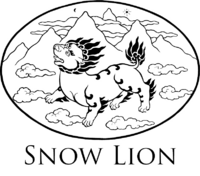- Foreword by Tenzin Dorjee8
- Preface by Rosemarie Fuchs10
- Introduction by Acharya Lodrö Namgyal12
- Part one: Root Text17
- 1. Tathagatagarbha19
- Introduction19
- The First Three Vajra Points: The Three Jewels20
- Buddha20
- Dharma20
- Sangha21
- The Three Refuges22
- The Last Four Vajra Points22
- The Fourth Vajra Point: The Element23
- The First Three Vajra Points: The Three Jewels20
- The Fifth Vajra Point: Enlightenment43
- The Sixth Vajra Point: Qualities53
- The Seventh Vajra Point: Activity59
- Benefit73
- Part Two: Commentary, The Unassailable Lion’s Roar79
- Table of Contents81
- Tathagatagarbha97
- Introduction97
- The First Three Vajra Points: The Three Jewels101
- The First Vajra Point: Buddha101
- The Second Vajra Point: Dharma105
- The Third Vajra Point: Sangha108
- The Three Refuges112
- The Last Four Vajra Points114
- The Fourth Vajra Point: The Element117
- The Fifth Vajra Point: Enlightenment182
- The Sixth Vajra Point: Qualities218
- The Seventh Vajra Point: Activity238
- Benefit283
- Part Three: Explanations by Khenpo Tsultrim Gyamtso Rinpoche299
- Part Four: Translator’s Notes391
((by SublimeText.Mediawiker)) |
((by SublimeText.Mediawiker)) |
||
| Line 2: | Line 2: | ||
|BookParentPage=Research/Secondary Sources | |BookParentPage=Research/Secondary Sources | ||
|FullTextRead=No | |FullTextRead=No | ||
|BookToc= | |BookToc=* {{i|Foreword by Tenzin Dorjee|8}} | ||
* {{i|Foreword by Tenzin Dorjee|8}} | |||
* {{i|Preface by Rosemarie Fuchs|10}} | * {{i|Preface by Rosemarie Fuchs|10}} | ||
* {{i|Introduction by Acharya Lodrö Namgyal|12}} | * {{i|Introduction by Acharya Lodrö Namgyal|12}} | ||
Revision as of 22:41, 7 September 2018
All sentient beings, without exception, have buddha nature, the inherent purity and perfection of the mind, untouched by changing mental states. The Mahayana Uttaratantra Shastra, one of the "Five Treatises" said to have been dictated to Asanga by the Bodhisattva Maitreya, presents the Buddha's definitive teachings on how we should understand this ground of enlightenment and clarifies the nature and qualities of buddhahood. This seminal text details with great clarity the view which forms the basis for Vajrayana, and especially Mahamudra, practice. Thus it builds a bridge between the Sutrayana and the Vajrayana levels of the Buddha's teaching, elaborated here in Jamgön Kongtrül's commentary. (Source: Shambhala Publications)
| Citation | Fuchs, Rosemarie, trans. Buddha Nature: The Mahayana Uttaratantra Shastra. By Arya Maitreya. Written down by Arya Asanga. With a commentary by Jamgön Kongtrül Lodrö Thayé ('jam mgon kong sprul blo gros mtha' yas) "The Unassailable Lion's Roar," and explanations by Khenpo Tsultrim Gyamsto Rinpoche. Ithaca, NY: Snow Lion Publications, 2000. |
|---|---|
- 'jam mgon kong sprul. theg pa chen po rgyud bla ma'i bstan bcos snying po'i don mngon sum lam gyi bshad pa srol dang sbyar ba'i rnam par 'grel ba phyir mi ldog pa seng ge'i nga ro. rumtek: karma pa chos sgar, 1972. Printed from woodblocks preserved at Rumtek Monasterty.

- Maitreya; Asaṅga. mahāyānottaratantraśāstra-ratnagotra-vibhāga, (theg pa chen po rgyud bla ma'i bstan bcos). (P5525), sems tsam, phi 54b7-74b6 (vol.108, p.24-32); (Tōh) 4024, sems tsam, phi 54b1-73a7. (N) phi 48b3-69a3. (Kinsha)3524, phi 64b1 (p.33-3-1). In bstan 'gyur (sde dge), Vol. 123: 107-146. Delhi: delhi karmapae choedhey, gyalwae sungrab partun khang, 1982-1985.



